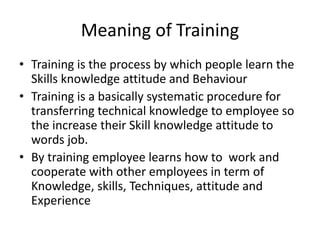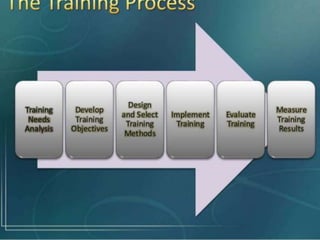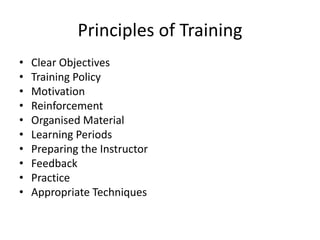Training dsb
- 1. Meaning of Training ŌĆó Training is the process by which people learn the Skills knowledge attitude and Behaviour ŌĆó Training is a basically systematic procedure for transferring technical knowledge to employee so the increase their Skill knowledge attitude to words job. ŌĆó By training employee learns how to work and cooperate with other employees in term of Knowledge, skills, Techniques, attitude and Experience
- 2. Features of Training ŌĆó Increases knowledge and skills for doing a job ŌĆó Bridges the gap between job needs and employee skills, knowledge and behaviour ŌĆó Job oriented process, vocational in nature ŌĆó Short term activity designed essentially for Operatives
- 3. Training and Education Training ŌĆó Level- Training is given for a particular job ŌĆó Purpose ŌĆō Improves skills and ability for limited purpose ŌĆó Scope ŌĆōTraining is only a part of education ŌĆó Knowledge ŌĆō Provide practical knowledge ŌĆó Orientation ŌĆōTraining is job oriented ŌĆó Place ŌĆōTraining is provided generally at the place of work Education ŌĆó Education increases General and subject knowledge ŌĆó Helpful for development for overall personality ŌĆó Scope of education is wider ŌĆó Education is based on theoretical knowledge and development of analytical ability ŌĆó Education is person oriented ŌĆó Education provides at school college and other classes
- 16. Principles of Training ŌĆó Clear Objectives ŌĆó Training Policy ŌĆó Motivation ŌĆó Reinforcement ŌĆó Organised Material ŌĆó Learning Periods ŌĆó Preparing the Instructor ŌĆó Feedback ŌĆó Practice ŌĆó Appropriate Techniques
- 17. Evaluation of Training ŌĆó Most of the managers and training directors assumes that any type of training is worth while however it is not a correct notion, it can not be claimed that training, in itself is effective unless it is evaluated. Methods of Evaluation of Training ŌĆó Test- Retest mehtod ŌĆó Pre- Post Performance method ŌĆó Experimental Control group method
- 18. Benefits to Employee ŌĆó Self Confidance ŌĆó Safety ŌĆó Adaptability ŌĆó New skills ŌĆó Promotions ŌĆó Higher Earning


















